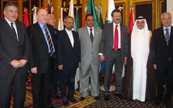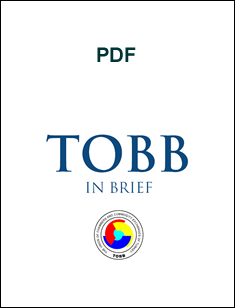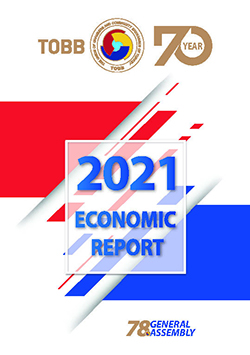The Turkish development model can be used as an example

26.07.2011 /
In his article published in the Oman Daily Gazette, Ahmed Al Obeidiliy wrote about the President of the Union of Chambers and Commodity Exchanges of Turkey, M. Rifat Hisarcıklıoğlu’s speech at the General Assembly of the Islamic Chamber of Commerce and Industry in Amman.
Citing from Hisarcıklıoğlu’s speech on the comparison of Turkish-Arab economies and the Gulf development model, Obeidiliy emphasized TOBB President Hisarcıklıoğlu’s suggestions on improving commerce between Islamic countries.
Ahmed Al Obeidiliy wrote in the Oman Daily Gazette;“In his speech, the President of the Union of Chambers and Commodity Exchanges of Turkey, M. Rifat Hisarcıklıoğlu provided information on the comparison of Turkish-Arab economies and the Gulf development model.The speech which I chanced upon was given at during the 28th Grand Assembly and the 8th Board Assembly of the Islamic Chamber of Commerce and Industry on 19-21 May 2011 in Amman.
Hisarcıklıoğlu mentions that the total gross domestic product 57 Islamic countries which make up 22.5% of the world’s population only account for 7.5% of the world total gross product. This figure is lower than Germany’s GDP. The magnitude of economic gap between the poorest and the richest Islamic country is on the order of 220 times the wealth. 22 of the world’s 49 poorest countries are Islamic countries. Hisarcıklıoğlu labels these as shameful scandals for Muslims and thinks that while natural resources profit governments, commerce profits the people. For this reason trade barriers between Islamic countries need to be abolished. The joint treaty for prioritizing trade between Islamic countries prepared by the Islamic Countries Conference has been signed by only 9 of the 57 countries.
Hisarcıklıoğlu urges the other countries to sign the treaty with all due haste. According to Hisarcıklıoğlu, Turkish businessmen view Palestine as “a land of opportunity” and want to invest. He also calls for Arab and Muslim businessmen to invest there and relates the story of one of their republic presidents, Özal. Today, the Turkish economy is the 17th in the world and 6th in Europe. This development was achieved solely by the redirection of the system in a more business and investment oriented direction, without financial resources. According to Turkish statistics, one of every 4 home appliances in Europe and one of every television set sold in Europe was produced in Turkey. All of these were achieved without oil or natural gas.
These figures are important, administrative workers in Islamic countries, especially the Gulf Cooperation Council countries, should focus on them and benefit from them. However benefiting from Turkish experience does not end with this. At present many Arabs are reinterpreting their history and reevaluating their present and future. Turkish experience should be benefited from as much as old experiences. The statistics that show the Islamic countries have fallen behind are noteworthy and the search for the main reason behind this is inevitable.
Hisarcıklıoğlu attributes the main problem to be the lack of leading businessmen concept and the lack of will in entrepreneurs of Islamic countries. According to him these were the reason behind the collapse of the Soviet Union. Instilling a spirit of entrepreneurship, of risk taking in the population, the sense of personal obligation for improvement of the person’s own life, the affirmation of the private sector’s role as leader and the limitation of the role of the government are all the formations of the leadership characteristics according to him. Investing, competing, living in a human world with all its struggle and change is essential for all societies.”
Your message has been sent
Thank you |
News Title |




